Related Research Articles

Cynthia Ann Stephanie Lauper is an American singer, songwriter, actress, and activist. Her album She's So Unusual (1983) was the first debut album by a female artist to achieve four top-five hits on the Billboard Hot 100—"Girls Just Want to Have Fun", "Time After Time", "She Bop", and "All Through the Night"—and earned Lauper the Best New Artist award at the 27th Annual Grammy Awards in 1985. Her success continued with the soundtrack for the motion picture The Goonies (1985) and her second record True Colors (1986). This album included the number-one single "True Colors" and "Change of Heart", which peaked at number three. Her cover of the Marvin Gaye song "What's Going On" was a moderate hit in 1987. In 1989, Lauper saw success with "I Drove All Night" and in 1993, had her first dance club hit with "That's What I Think".

True Colors is the second studio album by American singer Cyndi Lauper, released on September 15, 1986, by Portrait Records. The album spawned several commercially successful singles as "True Colors", "Change of Heart", and "What's Going On" reached the top 20 of the Billboard Hot 100, with the first two charting within the top five. The album was produced by Lauper herself together with Lennie Petze.

The Alliance for Justice (AFJ) is a progressive judicial advocacy group in the United States. Founded in 1979 by former president Nan Aron, AFJ monitors federal judicial appointments. AFJ represents a coalition of 100 politically liberal groups that have an interest in the federal judiciary. The Alliance for Justice presents a modern liberal viewpoint on legal issues.
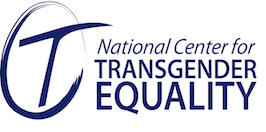
The National Center for Transgender Equality (NCTE) is a nonprofit social equality organization founded in 2003 by transgender activist Mara Keisling in Washington, D.C. The organization works primarily in the areas of policy advocacy and media activism with the aim of advancing the equality of transgender people in the United States. Among other transgender-related issue areas, NCTE focuses on discrimination in employment, access to public accommodations, fair housing, identity documents, hate crimes and violence, criminal justice reform, federal research surveys and the Census, and health care access.
The Corporate Equality Index is a report published by the Human Rights Campaign Foundation as a tool to rate American businesses on their treatment of gay, lesbian, bisexual and transgender employees, consumers and investors. Its primary source of data are surveys but researchers cross-check business policy and their implications for LGBT workers and public records independently. The index has been published annually since 2002. Additionally, the CEI focuses on the positive associations of equality promoting policies and LGBT supporting businesses which has developed to reflect a positive correlation between the promotion of LGBT equality and successful organizations. Following the top 100 corporations that are publicly ranked under the CEI, participating organizations remain anonymous. For businesses looking to enforce and expand LGBT diverse and inclusive policies, the CEI provides a framework that allows businesses to recognize and address issues and policies that restrict equality for LGBT people in the workplace.

The rights of lesbian, gay, bisexual, transgender, and queer (LGBTQ) people in the United States are among the most advanced in the world, with public opinion and jurisprudence changing significantly since the late 1980s.
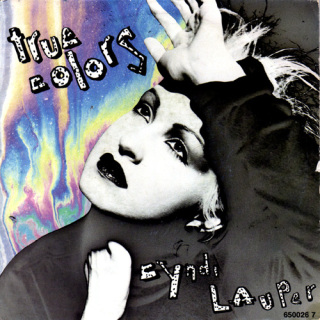
"True Colors" is a song written by American songwriters Billy Steinberg and Tom Kelly. It was both the title track and the first single released from American singer Cyndi Lauper's second studio album of the same name (1986). Released in mid-1986, the song spent two weeks at number one on the US Billboard Hot 100, being Lauper's second and last single to occupy the top of the chart. It received a Grammy Award nomination for Best Female Pop Vocal Performance.
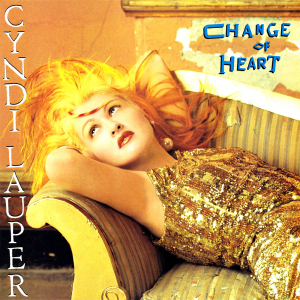
"Change of Heart" is a song by American singer and songwriter Cyndi Lauper, released on November 11, 1986 as the second single from her second album, True Colors (1986). It went gold in the US, peaking at No. 3 on the Billboard Hot 100. The song was written by singer-songwriter Essra Mohawk. Popular remixes by Shep Pettibone were also released. A music video was produced for the song, filmed in Trafalgar Square in London. It features Lauper and her tour band performing the song in front of a large group of people. The Bangles sang background vocals on the original recording. A live version of the song was released on Lauper's live album/DVD, To Memphis, with Love.
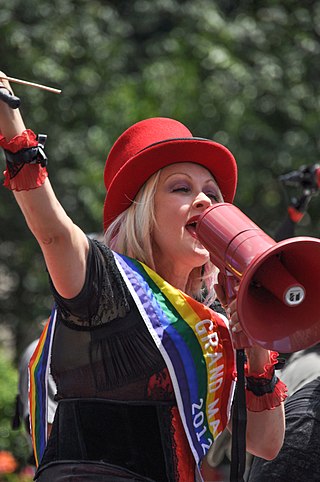
American singer Cyndi Lauper has released eleven studio albums, six compilation albums, five video albums and fifty-three singles. Worldwide, Lauper has sold approximately 50 million albums, singles and DVDs. According to RIAA, She has sold 9.5 million certified albums in the United States with She's so Unusual being her biggest seller.

Memphis Blues is the eleventh studio album by American singer Cyndi Lauper, containing cover versions of classic blues songs. Regarded as a continuation of her 2008 comeback, the album was a nominee for the Grammy Awards 2010 and was released on her 57th birthday, June 22, 2010. According to the Brazilian daily newspaper O Globo, the album had sold 600,000 copies worldwide by November 2010. Memphis Blues was voted the 7th best album of 2010 by the New York Post, and it went on to become Billboard's biggest selling blues album of 2010. To support the album, Lauper made her biggest tour ever, the Memphis Blues Tour, which had more than 140 shows.

The Memphis Blues Tour was the eleventh concert tour by American recording artist Cyndi Lauper, in support of her eleventh studio album. The tour visited the Americas, Asia, Australia and Europe. During the trek, Lauper performed at numerous jazz festivals including the New Orleans Jazz & Heritage Festival, Jazz à Vienne and Jazz Fest Wien. In the fall of 2011, Lauper continued the tour as a co-headlining show with Dr. John titled From Memphis to Mardi Gras. Lauper performed over a hundred concerts beginning in June 2010 and ending in November 2011.
A vulnerability index is a measure of the exposure of a population to some hazard. Typically, the index is a composite of multiple quantitative indicators that via some formula, delivers a single numerical result. Through such an index "diverse issues can be combined into a standardised framework...making comparisons possible". For instance, indicators from the physical sciences can be combined with social, medical and even psychological variables to evaluate potential complications for disaster planning.
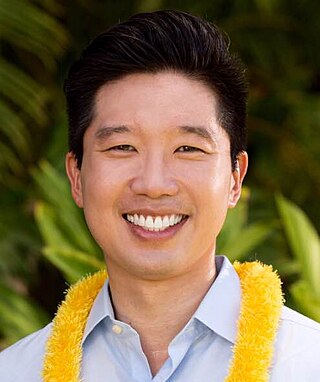
Stanley Chang is a Democratic member of the Hawaii State Senate, representing the 9th district. Before entering the legislature, he served as a Honolulu city councilman. He defeated Sam Slom, the last remaining Republican in the Hawaii State Senate, in 2016. Chang faced Slom a second time in 2020, and won reelection.

True Colors United is an American nonprofit organization addressing the issue of youth homelessness in the United States. Founded in 2008 by Cyndi Lauper, the organization focuses on the unique experiences of LGBT youth, who make up 40% of the homeless youth population in the United States.
In the United States, LGBT youth of colour are marginalized adolescents in the LGBT community. Social issues include homelessness; cyberbullying; physical, verbal and sexual abuse; suicide; drug addiction; street violence; immigration surveillance; engagement in high-risk sexual activity; self-harm, and depression. The rights of LGBT youth of colour are reportedly not addressed in discussions of sexuality and race in the larger context of LGBT rights.
Education sector responses to LGBT violence addresses the ways in which education systems work to create safe learning environments for LGBT students. Overall, education sector responses tend to focus on homophobia and violence linked to sexual orientation and gender identity/expression, and less on transphobia. Most responses focus in some way on diverse expressions of gender and support students to understand that gender may be expressed in a different way from binary models. Responses vary greatly in their scope ; duration ; and level of support that they enjoy.

Andrew S. Cray was an American LGBT rights activist and political figure. Cray played a central role in securing new nationwide LGBTQ nondiscrimination protections as part of the Affordable Care Act, partnering with the White House and the Department of Health and Human Services to create the Out2Enroll initiative to connect LGBTQ people with health insurance coverage options, assisting with the passage of the HOPE Act to make organ donation and transplantation more accessible to people with HIV, and drafting new provisions addressing the needs of LGBTQ youth for the Runaway and Homeless Youth Act.
The VH1 Trailblazer Honors, also known as the Logo Trailblazer Honors, is the only televised LGBT awards ceremony in the United States. It is an annual awards event founded in 2014 to recognize persons and entities who have made significant contributions towards minority empowerment and civil activism. It has been described as a combined "queer State of the Union, Hall of Fame, and Oscars." The event is aired on Logo TV and VH1.

The ongoing COVID-19 pandemic has highlighted inequities experienced by marginalized populations, and has had a significant impact on the LGBT community. Pride events were cancelled or postponed worldwide. More than 220 gay pride celebrations around the world were canceled or postponed in 2020, and in response a Global Pride event was hosted online. LGBTQ+ people also tend to be more likely to have pre-existing health conditions, such as asthma, HIV/AIDS, cancer, or obesity, that would worsen their chances of survival if they became infected with COVID-19. They are also more likely to smoke.
References
- 1 2 3 "New Index Ranks State Efforts to Alleviate Youth Homelessness". Route Fifty. 2021-02-24. Retrieved 2023-11-07.
- 1 2 Mitchell, Gail (2018-06-29). "Cyndi Lauper's True Colors Fund & National Law Center Partner to End Youth Homelessness". Billboard. Retrieved 2023-11-07.
- ↑ "The Best 5 States for Homeless Youth — and the Worst". www.advocate.com. Retrieved 2023-11-07.
- ↑ Herman, James Patrick (2018-06-29). "Cyndi Lauper on Justice Kennedy, Threat to LGBTQ Rights: 'Get Off Your Butt'". Variety. Retrieved 2023-11-07.
- 1 2 "Teachable Tuesday: State Index on Youth Homelessness. - National Runaway Safeline". 2018-11-20. Retrieved 2023-11-07.
- 1 2 3 "Pandemic Saw States Improve Response To Youth Homelessness - Invisible People". invisiblepeople.tv. 2022-03-29. Retrieved 2023-11-07.
- 1 2 "2021 "State Index on Youth Homelessness" Outlines States' Preparedness to Address and Prevent Youth Homelessness". National Low Income Housing Coalition. Retrieved 2023-11-07.
- ↑ admin (2021-10-15). "Housing for Homeless LGBTQ Youth in Chicago". Unity Parenting and Counseling. Retrieved 2023-11-07.
- 1 2 "This Tool Ranks States On How They Treat Homeless Youth". Teen Vogue. 2018-07-03. Retrieved 2023-11-07.